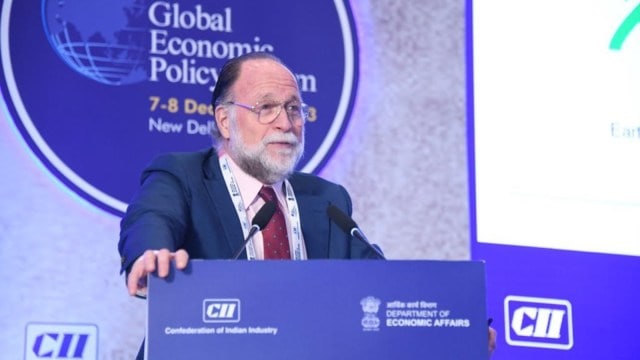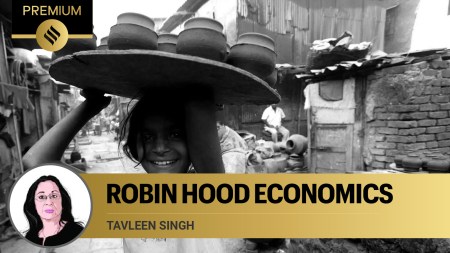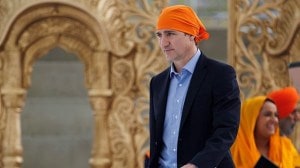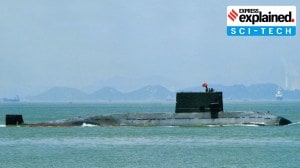- India
- International
Country of 1.4 billion people can’t rely on service sector alone, need all growth engines to fire for jobs, says Harvard’s Ricardo Hausmann
Hausmann warned that India’s petroleum exports may not be sustainable. India’s refined petroleum exports have been on the rise and has helped India register net export growth in FY23 even as non-oil exports remained stagnant.
 Ricardo Hausmann. (Express File Photo)
Ricardo Hausmann. (Express File Photo)India is witnessing remarkable success in the service sector that primarily employs high-skilled workers but the world’s most populous country that continuous to have a “surprisingly small” presence in global goods market compared to the size of the economy needs jobs for everyone, said Ricardo Hausmann, founder and Director of Harvard’s Growth Lab in an interview with The Indian Express.
He, however, believes that India is in the right by making major investments in infrastructure which has accelerated growth rates in some parts of the country such as Uttar Pradesh, where connectivity has improved enormously.
Hausmann, Professor of Economic Development at Harvard University who famously developed the ‘Economic Complexity Index’ that projects a country’s growth potential based on the progress made by it in expanding and diversifying its export basket over the years, predicted that India has the highest potential for growth in the coming year compared to any other country in the world. But Hausmann said India “hasn’t been exploiting” that potential.
“India is the country that has the easiest, or the highest diversification potential. But it hasn’t been exploiting that potential. So we think if it exploited that potential, then that will generate another emphasis for growth. But we think that goods have been hurt relative to services because goods are relatively intensive in inputs that India has been very bad at providing and those inputs are things like mainly the infrastructure side, transportation, infrastructure, logistics, energy, water, etc,” Hausmann said during the interview on the sidelines of CII’s Global Economic Policy Forum 2023.
The economic complexity index (ECI) shows a stagnation over the last two decades as India could barely move from 43 in 2000 to 42 in 2021. During the comparable duration, China managed to move from 39 to 18, Vietnam from 93 to 61 and UAE from 81 to 56. ECI measures the current state of a country’s productive knowledge. Countries improve their ECI ranking by increasing the number and complexity of the products they successfully export.

“I think that India’s success in services is remarkable. It may be that the index doesn’t fully capture that. But it’s also the case that India’s presence in many industries in the global market is surprisingly small. India is smaller than Bangladesh in textiles, it is smaller than Thailand in machinery. It is smaller than Vietnam in terms of electronics. That’s in part because the success that happened in services has not yet happened in manufacturing,” he said.
“IT and business services are more skill intensive, not a good sector. And you need jobs for everybody then you have 1.4 billion people so you want to rely on more than one engine,” Hausmann remarked.
The services sector contributes over 50 per cent to India’s GDP but employs less than a third of the country’s labour force, according to the 2022-23 Economic Survey. According to a recent report by Federation of Indian Export Organisations (FIEO), India’s labour-intensive export sectors such as apparels, marine products, plastics, and gems and jewellery are showing a “troubling pattern” as the country is experiencing a decline in global market share across these segments during the last five years.
Hausmann believes that even the regulatory environment has tended to place more burdens on goods than on services. “Services don’t need those things. And that’s why services are expressing what India could be without transportation, energy and other constraints,” he said.
“The country is doing the right thing by privileging infrastructure investments relative to the calls for, say universal basic income. Because universal basic income will be extracted from the public resources etc. But infrastructure will add to the environment will increase production potential, and after tax revenues that will make it sustainable,” he said.
Hausmann warned that India’s petroleum exports may not be sustainable. India’s refined petroleum exports have been on the rise and has helped India register net export growth in FY23 even as non-oil exports remained stagnant.
“The industry probably has benefited from buying oil from sanction countries, like Russia and Venezuela. I think that that is going to go away, eventually. And you have to think of the sustainability of that industry in a world where India no longer benefits from all of other countries’ willingness to incur costs in order to constrain some bad actors,” he said.
Apr 29: Latest News
- 01
- 02
- 03
- 04
- 05






































